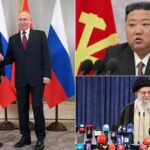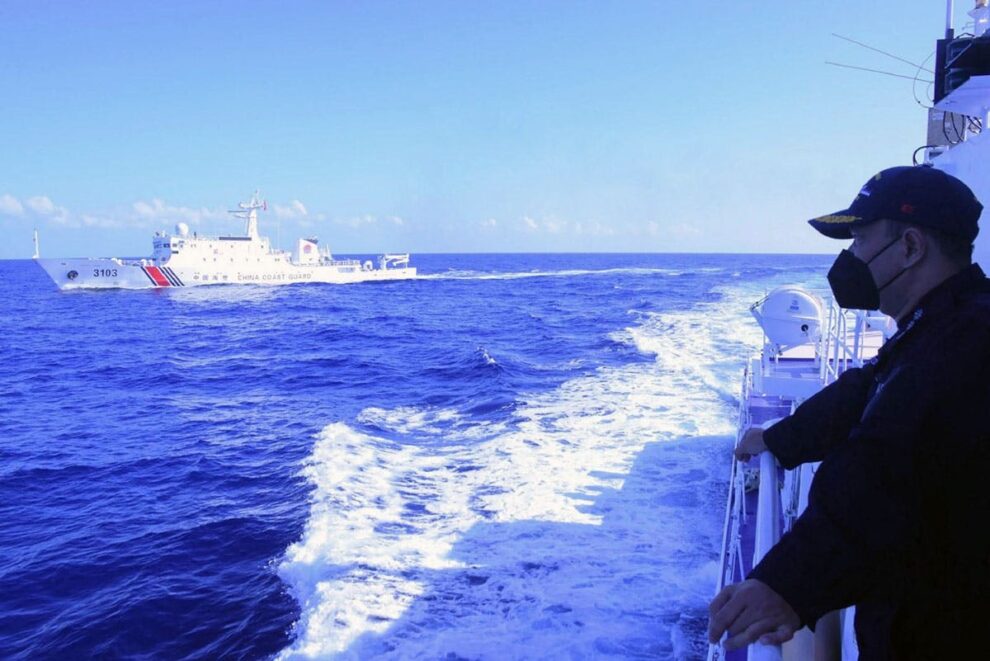MANILA, Philippines — China strongly opposed yesterday joint patrols in the West Philippine Sea and expanded United States access to Philippine military bases, calling the moves part of Washington’s efforts to encircle and contain Beijing through its military alliance with the Philippines.
The Chinese embassy in Manila said that the US keeps upgrading its military cooperation with the Philippines by adding Enhanced Defense Cooperation Agreement (EDCA) bases and military deployment in the Southeast Asian country to secure its hegemony, selfish geopolitical interests, and out-of-the-Cold War mentality.
The embassy issued the statement following a GMA News interview of US Ambassador MaryKay Carlson on EDCA and the South China Sea.
“Whereas the US claims that such cooperation is intended to help the disaster relief efforts of the Philippines and some Americans even tout the EDCA sites as driver of local economy, it is plain and simple that those moves are part of the US efforts to encircle and contain China through its military alliance with this country,” the embassy spokesperson said.
The embassy warned that bundling the Philippines into the chariots of geopolitical strife will seriously harm Philippine national interests and endanger regional peace and stability.
The Philippines and the US announced last month a deal to provide US forces with expanded access to its military bases amid China’s military build-up in the disputed South China Sea.
The agreement giving the US access to four more locations under the EDCA that allows US troops to rotate for extended periods and access local military bases was announced during the visit of US Defense Secretary Lloyd Austin.
Despite escalating Chinese aggression in the West Philippine Sea, the embassy insisted that “there is no problem of freedom of navigation in the South China Sea.”
“When talking about free and open waterways, what the US has in its mind is actually the freedom of rampage of its warships in the South China Sea,” it added.
Carlson said the US is pleased that the Philippines is ready for joint patrols.
The US, she noted, has similar activities with other allies and the joint patrol with the Philippines will be one important component of making sure that waterways are free and open.
Multilateral patrols
The Department of Foreign Affairs said the Philippine government is crafting guidelines on joint patrols in the West Philippine Sea.
Operational details, including the possibility of engaging other countries will be part of the discussions between the Philippines and the United States within the framework of the Mutual Defense Board and Security Engagement Board.
The Philippines is in talks to possibly include Australia and Japan in planned South China Sea patrols with the US.
If the plan materializes, it will be the first time the Philippines has joined multilateral maritime patrols in the South China Sea, a move that would likely anger Beijing, which claims most of the sea as its territory.
Beijing slammed the US, saying its military has been coming all the way from the other side of the Pacific to “stir up trouble in the South China Sea and ganging up with its allies from other parts of the world to flex muscle in the South China Sea.”
“By doing these, the US has not only heightened tension, driven wedge between China and the Philippines, but also has disturbed and upset the joint effort of countries in this region to safeguard peace and stability in the South China Sea,” it said.
‘Explore natgas in Reed Bank’
Meanwhile, an international affairs expert called on the Philippine government to allow oil and natural gas exploration in the Reed Bank in Palawan, which is well within the country’s exclusive economic zone.
Renato de Castro, program convenor and trustee of think tank Stratbase-Albert del Rosario Institute (Stratbase-ADRI), said that doing so is a means for Manila to undertake “shaping operations” that counter the so-called gray zone operations of China in the West Philippine Sea.
De Castro pointed out that the country’s neighbors like Malaysia and Indonesia have taken such shaping operations in the South China Sea to their benefit, as China had stepped back from their gray zone activities in waters it was making claims on against the two countries.
“The goal is to create a sharp deterrent effect by undermining the adversary’s sense of initiative and leadership of the crisis triggered by its gray zone operations through the imposition of multiple dilemmas, posturing assets, to threaten what the adversaries value, and displaying the willingness to apply asymmetric capabilities,” De Castro said in a Stratbase-ADRI web forum.
“Most importantly, is showing a willingness to confront,” he added.
‘Shaping operation’
The forum in which De Castro explained shaping operations included Commodore Jay Tarriola, adviser of the commandant for maritime security of the Philippine Coast Guard; professor Jay Batongbacal, a maritime law expert; retired Col. Raymond Powell, fellow of the Gordian Knot Center for National Security Innovation; retired Rear Admiral Rommel Jude Ong, Ateneo School of Government professor of Praxis; and international affairs expert Charmaine Willoughby, associate professor at De La Salle College-Manila.
“A good example is the case of Indonesia and Malaysia. When they were trying to survey – in the case of Indonesia their North Natuna waters, and Malaysia their continental shelf – China told them: don’t do it. They did otherwise. Without any allies, without any ruling,” he said.
De Castro said that a shaping operation that can be undertaken by the Philippines could be a unilateral exploration of the Reed Bank, which is said to be rich in natural gas deposits.
“We have our treaty allies, we have our security partners. And we have our arbitral ruling,” De Castro said.
“What the Philippines simply lack is political will. So by having political will, we could take the initiative against the other side. So, not simply becoming a victim or the passive participant in this game of cat-and-mouse which we call gray zone operations,” he added.
De Castro said that the Philippines has the advantage of “multilateralism” by having multilateral allies against China’s aggressive actions.
“We already have a coalition that is already out there. You have the informal security partnership of four countries – Manila, Canberra, Tokyo and of course, Washington D.C.,” De Castro noted.
Taking the initiative was a logical strategy to take in the face of the miserable failure of the “appeasement” strategy taken by the previous Duterte administration with China. “China never returned the love that Duterte showed to China,” De Castro said. – Rainier Allan Ronda
Source: Philstar















